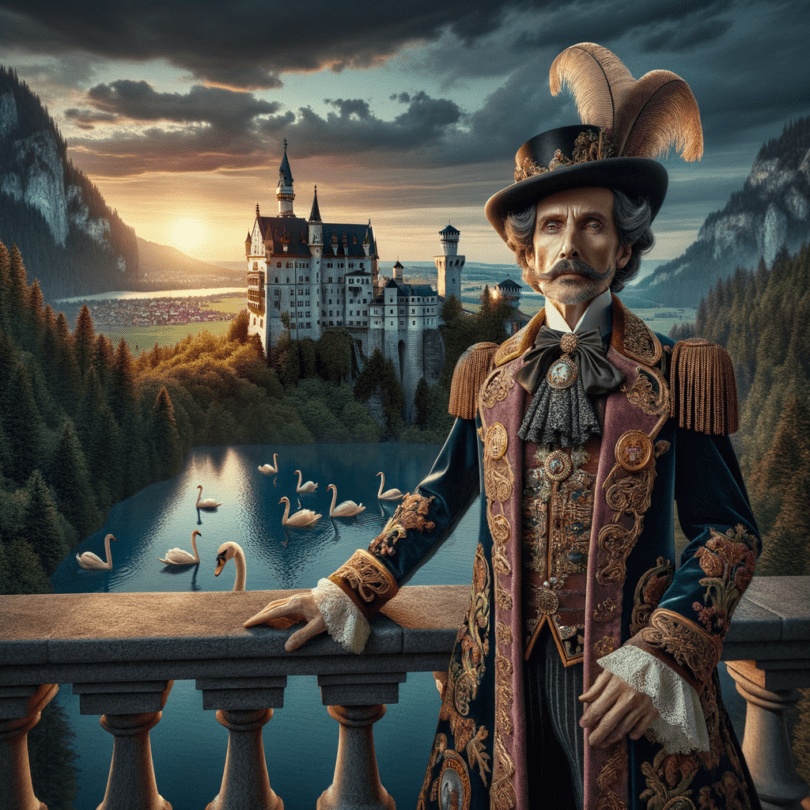You know, sometimes when I dig through history, it’s like I’ve stumbled upon a treasure trove of eccentric personalities, and among them, King Ludwig II of Bavaria is like this glowing gem that just can’t be ignored. His life was this dazzling concoction of splendor, dreams, and, sadly, a touch of tragedy. People often called him “Mad King Ludwig,” but that never sat right with me. To me, he was more like a dreamer who just didn’t quite fit into the cutthroat world of politics and stiff-lipped power games.
Born way back in 1845 into Bavarian royalty, Ludwig was thrust headfirst into this life of expectations and opulence. Imagine growing up in the majestic corridors of a palace – most of us would probably think it’s like living in a storybook. But for Ludwig, it must’ve been more of an ill-fitting costume. I bet his parents, King Maximilian II and Queen Marie, hoped he’d turn into this ancient version of a CEO, managing state affairs with a cool head. But Ludwig? Oh, he was the kid with his head in the clouds, more caught up in the world of imagination and artistic whims.
Childhood and Inception of Fantasies
As Ludwig grew, so did his love affair with myths, fables, and fairy tales, especially since he had the Bavarian landscape as his backyard, full of epic mountains and mysterious forests. That had to be the perfect recipe to fuel his imagination, right? I think there was something in those stories that tugged at his heartstrings, stirring up a yearning for heroism and adventure. Ludwig didn’t just want to be “the king” in a distant, formal sense – he wanted to be a knight in shining armor, the protagonist of an epic saga.
You know those dreams you retreat into when the world around you gets too heavy? For Ludwig, these fantasies were his sanctuary, a place where the burdens of royalty couldn’t reach him. It makes me wonder, isn’t that what all of us secretly desire – a place of absolute freedom within our dreams, away from demanding voices? For Ludwig, his fantasies were woven together into a tapestry of splendid castles and enchanting tales, weaving a space that was uniquely his own.
But life has this knack for creeping up on you, and at just eighteen, Ludwig found himself king after his father’s passing. Seriously, stepping onto that throne wasn’t like a gentle transition; it was more of a dive headfirst into cold, choppy waters of responsibility greater than he ever imagined. Suddenly, diplomacy and governance weren’t words, they were real-world tests he had to master.
The King Who Chased Shadows
But Ludwig, oh bless him, he wasn’t cut out for the whole ruling gig. Instead, he chased after his passions – music, architecture, art – with a kind of single-minded intensity. He was head over heels for Richard Wagner’s music, which was as dramatic and grandiose as his own dreams. Can’t you just picture him, sitting enraptured in the audience, swept away by operatic sweeps that matched the turmoil in his heart? Wagner was like the kindred spirit his soul craved for.
He didn’t just love Wagner’s music; he poured resources into it like an ardent fan supporting their favorite band. Saying he supported Wagner’s career is an understatement – Ludwig was all in, funding his work like it was a mission from the heavens. His dedication was so intense that he even had some downright jaw-dropping castles built, inspired by Wagnerian themes, including the now-famous Neuschwanstein Castle. These places weren’t just buildings; they were Ludwig’s heart plastered onto the earth in stone and spire.
Neuschwanstein to Ludwig must’ve been akin to a fairytale cocoon where he could escape the gnawing expectations of real-world ruling. A beautiful hideaway where his dreams could breathe unrestricted. Yet, as magnificent as all this was, it was also a sign that he was slipping further from reality. For the practical folks of Bavaria, his fantastical projects were reminders that the king was losing touch with the ‘real stuff’ of kingship.
Personal Struggles and Isolation
Ludwig’s battles were as much within his mind as they were in his political circles. There’s something brutally isolating about his life – can you imagine being surrounded by people yet feeling utterly alone? He grappled with inner demons, retreating into the shadows as rumors about his odd behavior grew louder.
It’s hard not to feel a pang for him – the world thought they knew him, but beneath, was a solitary soul fighting to just be understood. As time marched on, his friendship with Wagner crumbled, likely due to the harsh whispers and plotting of court politics. Can you even begin to fathom the heartbreak of feeling abandoned by someone you saw as an ally? It’s a tough, tough break for someone who gave so freely of himself.
As whispers of his supposed madness and peculiar ways spread, they quickly eclipsed his achievements. His passion projects, seen by some as whimsical, reckless spending, led to growing discontent amongst those who prioritized state function over personal whimsy. And so, the dreamer king found himself at odds with a world focused on balance sheets and politics instead of dreams.
The Fall of the Dreamer King
By the 1880s, Ludwig’s struggles culminated in a crisis. His ministers, at their wit’s end due to his haphazard financial decisions and obvious detachment from daily rule, decided he was no longer fit for the throne. They labeled him insane, a mark that clung to his legacy bitterly.
With haunting inevitability, in June of 1886, Ludwig was deposed, labeled mentally unfit, and shipped off to a castle far from the intrigue of court life. Ironically, the fairy tale world he had spun around him was shattered, left in pieces by those very plots he sought to distance himself from.
Ludwig’s story crescendoed with a mysterious death just days after his removal, found in the waters of Lake Starnberg. The official line calls it a suicide, but, like all great stories tinged with mystery, theories abound. Was it really suicide, or was there a darker hand at play? Truly, it’s a riddle as deep as the lake itself. Maybe we’ll never know the truth, yet there’s a kind of haunting beauty to that lingering mystery.
Legacy of Tragedy and Beauty
Even if his reign was marred with challenges, Ludwig left a mark impossible to erase – a legacy laced with both the seductive charm and ineffable sorrows of unfulfilled dreams. His castles stand as silent witnesses to his indomitable spirit – architectural marvels that whisper tales of imaginations unshackled. They’re reminders that beauty itself can defiantly smile even in the face of time’s ruthless march.
Perhaps Ludwig’s tale serves as a gentle reminder, a poignant song for dreamers everywhere who long for something beyond the ordinary. He was just a person, like you and me – filled with hope, imperfections, and vulnerabilities. Maybe some see madness in his endeavors, but maybe, just maybe, he was a lonely dreamer who dared to chase the sun, even if it burned him.
Thinking of Ludwig II brings out this bittersweet cocktail of admiration and melancholy in me. As the mist softly envelopes the grand Bavarian mountains, visitors still flock to his castles, awestruck by their spellbinding allure and mystery. In those elegant structures, whispers of a king whose dreams reached beyond time linger still. Perhaps, somewhere within those opulent walls, the dreamer king finally finds peace amid his most cherished visions.

